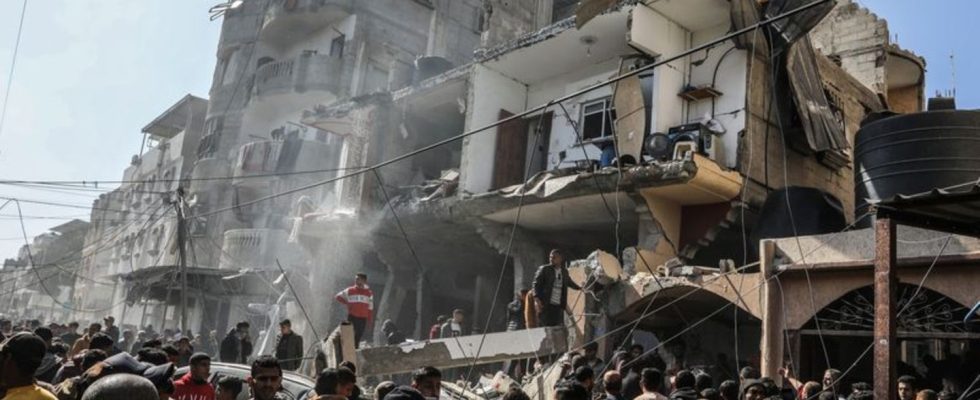Israel’s head of government is sticking to his war plans despite ongoing negotiations. At home there is chaos during protests. The news at a glance.
In the Gaza war between Israel and the Islamist Hamas, the mediating states are intensifying their efforts to reach an agreement on a ceasefire that could at least temporarily avert an impending Israeli ground offensive in Rafah. The Israeli war cabinet decided to send a delegation to Qatar for further talks in the coming days, reported the well-connected Israeli journalist Barak Ravid from the news portal “Axios” after the meeting.
Previously, an important meeting of mediators Egypt, Qatar and the USA with the participation of an Israeli delegation in Paris helped to restart the previously deadlocked negotiations on a ceasefire and the release of hostages held by Hamas. However, Israeli representatives made it clear on Saturday that there was still a long way to go before an agreement was reached.
Clashes in Israel during anti-government protests
Thousands of people demonstrated in several Israeli cities for the release of the hostages and against the government of Prime Minister Benjamin Netanyahu. According to local media reports, there was chaos and violent clashes between government opponents and the police. In Tel Aviv, a group of protesters tried to block a highway.
Police used water cannons and mounted officers in the city to disperse the demonstrators. It said 21 people were arrested. There were injuries. Opposition leader Jair Lapid condemned the police actions. “The violent action by the police this evening against demonstrators, including the families of the hostages, is dangerous, anti-democratic and must not continue,” the media quoted Lapid as saying in a statement.
USA and Great Britain bomb Houthi positions
Meanwhile, US and British forces attacked Houthi militia positions in Yemen again overnight. With the support of other countries, 18 targets of the Iranian-backed militia were attacked in eight locations in Yemen, the US Department of Defense said in Washington.
The USA and Great Britain responded to the Houthis’ ongoing attacks on shipping in the Red Sea. The targets included underground Houthi weapons depots, missile storage facilities, drones, air defense systems and radar systems. According to their own statements, the Houthis are acting in solidarity with Hamas in Gaza and want to force an end to the Israeli attacks in the Gaza Strip by shelling merchant ships.
Netanyahu is pushing ahead with plans for a military offensive
Israeli Prime Minister Netanyahu wants to quickly launch plans for a military offensive in Rafah in southern Gaza despite ongoing ceasefire negotiations. He said on X that he would convene the cabinet at the beginning of the week to have the operational plan approved. The plan will also include the evacuation of civilians. The working week in Israel begins today.
The planned offensive has been heavily criticized internationally. Even allies like the US are calling on Israel to show restraint because 1.5 million Palestinians in Rafah are seeking protection from the fighting in other parts of the sealed-off coastal area in a small space and under miserable conditions. “Only a combination of military pressure and hard negotiations will lead to the release of our hostages, the elimination of Hamas and the realization of all war goals,” Netanyahu wrote.
Struggle to agree on a ceasefire before Ramadan
An Israeli delegation had previously met in Paris with representatives of Egypt, Qatar and the USA, which were mediating in the war between Israel and Hamas. According to reports, “significant progress” has been made. The talks went “very well,” the Israeli newspaper Haaretz reported, citing unnamed people who are said to be familiar with the details of the meeting.
A foreign diplomat was quoted as saying that an agreement could be reached before the start of the Muslim fasting month of Ramadan. Ramadan begins around March 10th this year. The biggest challenge for the mediators is to reach an agreement that, on the one hand, convinces Hamas that a permanent ceasefire is possible after a humanitarian ceasefire. And at the same time it enables Israel to avoid such an obligation, wrote the Wall Street Journal.
Report: Hamas sticks to its demand
An Israeli delegation with a limited mandate should now discuss technical issues in Qatar, for example the amount of aid for the Gaza Strip, journalist Ravid reported on X, citing Israeli sources. The progress made in Paris now allows negotiations on the details of the deal, wrote the Jerusalem Post, citing people familiar with the talks.
This refers, for example, to the number of Palestinian prisoners who could be released in return for the hostages kidnapped from Israel. First, the mediators would have to get Hamas to agree to the new framework for a deal, it was said. The Israeli news site Ynet reported, citing media adviser to Hamas leader Ismail Haniya, that Hamas continues to demand an end to the war and the withdrawal of the Israeli army. We have not yet reached the stage of talking about a prisoner exchange.
During a week-long ceasefire brokered by Qatar last November, 105 hostages were released in return for 240 Palestinian prisoners as part of a deal between Israel and Hamas. There are currently around 130 hostages still being held by Hamas in the Gaza Strip. Hamas, together with other extremist groups, attacked southern Israel on October 7 last year, killing 1,200 people and abducting another 250 to the Gaza Strip. This was the trigger for the war. According to Israeli estimates, after almost five months of war, only around 100 of the hostages held by Hamas are still alive.
What is important today
The struggle for a ceasefire in the Gaza war continues at full speed. Meanwhile, Israel’s government is pushing ahead with highly controversial plans for a ground offensive on Rafah.

